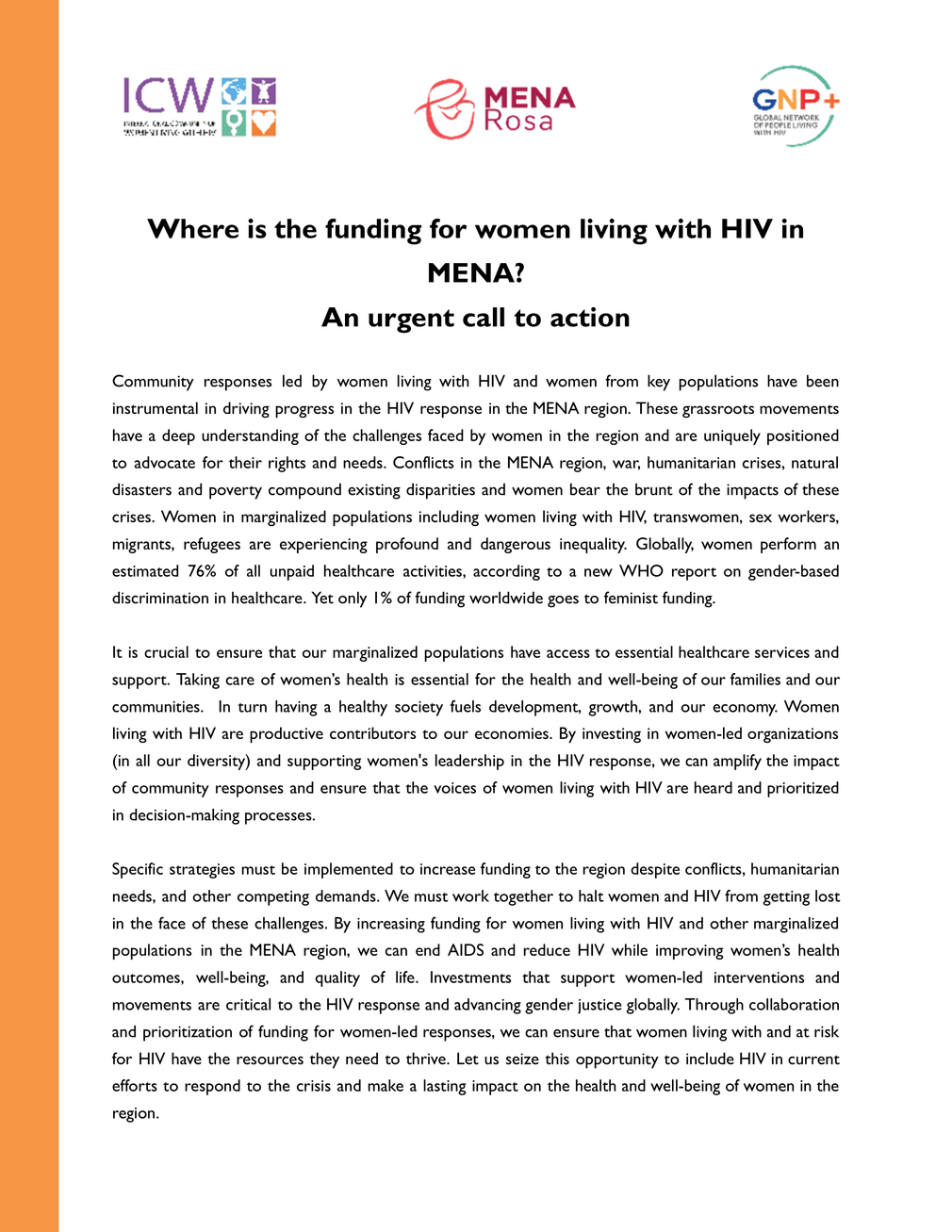Where is the funding for women living with HIV in MENA? An urgent call to action
- ICW

- Apr 9, 2024
- 2 min read
Community responses led by women living with HIV and women from key populations have been instrumental in driving progress in the HIV response in the MENA region. These grassroots movements have a deep understanding of the challenges faced by women in the region and are uniquely positioned to advocate for their rights and needs. Conflicts in the MENA region, war, humanitarian crises, natural disasters and poverty compound existing disparities and women bear the brunt of the impacts of these crises. Women in marginalized populations including women living with HIV, transwomen, sex workers, migrants, refugees are experiencing profound and dangerous inequality. Globally, women perform an estimated 76% of all unpaid healthcare activities, according to a new WHO report on gender-based discrimination in healthcare. Yet only 1% of funding worldwide goes to feminist funding.
It is crucial to ensure that our marginalized populations have access to essential healthcare services and support. Taking care of women’s health is essential for the health and well-being of our families and our communities. In turn having a healthy society fuels development, growth, and our economy. Women living with HIV are productive contributors to our economies. By investing in women-led organizations (in all our diversity) and supporting women's leadership in the HIV response, we can amplify the impact of community responses and ensure that the voices of women living with HIV are heard and prioritized in decision-making processes.
Specific strategies must be implemented to increase funding to the region despite conflicts, humanitarian needs, and other competing demands. We must work together to halt women and HIV from getting lost in the face of these challenges. By increasing funding for women living with HIV and other marginalized populations in the MENA region, we can end AIDS and reduce HIV while improving women’s health outcomes, well-being, and quality of life. Investments that support women-led interventions and movements are critical to the HIV response and advancing gender justice globally. Through collaboration and prioritization of funding for women-led responses, we can ensure that women living with and at risk for HIV have the resources they need to thrive. Let us seize this opportunity to include HIV in current efforts to respond to the crisis and make a lasting impact on the health and well-being of women in the region.
WEBINAR: CSW 68 PARALLEL EVENT
ICW recently convened a panel to address the critical situation for women living with and affected by HIV in the MENA region. Amid conflict and limited healthcare access, compounded by the withdrawal of multilateral support, the reproductive and maternal health is increasingly jeopardized. The discussion highlighted a funding crisis for women’s health priorities, marking an urgent call for global investment in women-led organizations. Despite their crucial role in the HIV response and gender justice, organizations face funding challenges, deprioritizing the HIV response. The panel, led by MENA Rosa, focused on enhancing the health and well-being of women living with or at risk of HIV, emphasizing the need for targeted support in this underfunded landscape.
Speakers:
· Rita Wahab, MENA Rosa
· Taline Torikian, MENA Rosa
· Mahy Hassan, GNP+’s MENA Focal Point
· Simone Salem, UNAIDS
· Malak Elkashif, Transat
















Best Solar Company in Karachi
I’m always open to exploring newer health options, and recently, I wanted to understand more about weight loss treatments. I found https://ways2well.com/blog/benefits-of-stem-cell-treatment-for-weight-loss and appreciated how it broke down complex science into simpler explanations. It discusses how stem cell therapy can aid in weight management in ways that are potentially gentler than other methods. They also mention things like recovery time and safety, which gave me a clearer picture of what’s involved. It’s informative for those wanting a natural path.